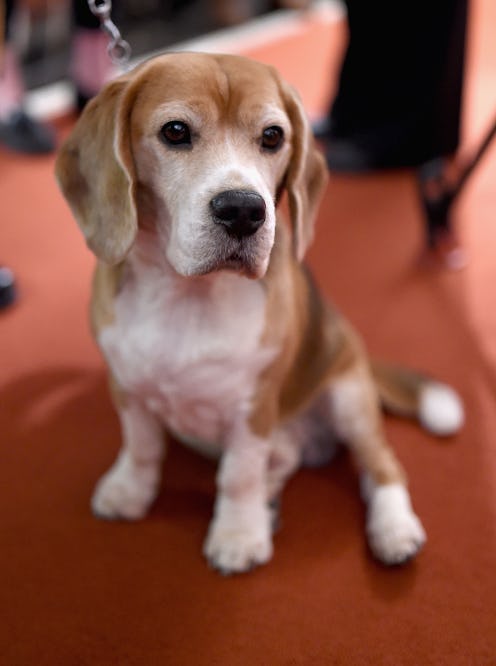Life
7 Dog Breeds That Get Along With Cats

Cats and dogs are considered natural opposites because, well, they kind of are. If you're a proud cat mom but want to introduce a dog into your household, it pays to know what dog breeds are good with cats — because it's not going to be all of them. Cats and dogs, despite the many heartwarming videos out there, aren't necessarily natural friends. For one, cats can be heavily territorial, which means introducing a (potentially much larger) animal into their space needs careful consideration and gradual acclimatizing. It's important to do your research about the best dog to bring home — and that includes breeds.
Dogs that have been bred specifically for chasing are often a bad idea when it comes to cats, because their chasing instincts will likely kick in; this includes greyhounds and other racing breeds. However, adult shelter dogs that have previously lived with cats can be an excellent bet; if you have information about their history with other animals and it's positive, that indicates they could be a great addition to a household with cats.
And it's important to note that a dog's breed offers no guarantees. A "cat-friendly" breed can still get scared or chase your feline around the house, and a dog that comes from an "unfriendly" breed may bely its reputation and become your cat's best mate. Here are just a few dog breeds that make cat companions.
1Labrador Retriever
The labrador is known for its temperament, which is gentle in the extreme, and the American Kennel Club notes they're very easy to socialize with other breeds. You will need to pay attention to their tendency to retrieve and mouth things, and their size compared to cats makes them far stronger, so training is essential — but they're a good candidate for making friends with your in-house feline.
2German Shepherd
These guard dogs may seem like an unusual pick, but experts at Vet Street note that they're good with other animals precisely because they're highly responsive to training and will be able to take cues from owners on whether cats are threats or things to avoid or be protected. They're also good at determining their place in the pack, and if they perceive the cats as higher in the rankings they'll keep well away from them.
3Cocker Spaniel
Vetstreet explains that cocker spaniels are prized as family pets for their gentleness, and that's a prime characteristic for doing well with other animals. They're also easily socialized, not too big, and easy to train to treat cats respectfully and keep out of their way if the felines aren't receptive to too many licks.
4Beagle
Even though beagles are hunting dogs, the AKC notes that they make for excellent additions to multi-pet households precisely because they were bred to work in packs and be friendly rather than competitive. They don't view other animals in the same space as threats, though they may try to get snuggly with cats because of their perspective that everything in sight is basically one of their own kind.
5Papillons
According to the AKC, the size of papillons, named for their butterfly-like ears, makes them good companions for families with cats; they're too small to pose a threat to the cat's safety, though even tiny dogs require proper training to make sure they respect humans and other animals. They're also good-natured and loyal, even to felines.
6Collie
Herding animals like the collie are reliably good with other animals because they've been trained to work with them. The only problem with collies, as with other intelligent herding breeds like Australian shepherds, is that they might try to "herd" your cat and get it into formation. It's a hilarious instinct, but one the cat may very well not appreciate, and it needs to be tackled with training.
7Cavalier King Charles Spaniel
These small dogs can be fussy, but they're also very laid-back and family-oriented, according to I Heart Dogs. And that can include cats as part of the family unit. As long as they're socialized to view the cat as just one of the members of their family, they'll likely be fine with them — and probably cope with kittens climbing all over their head.
Any dog or cat being introduced into a household where there are already pets needs to be treated with care. Enlist specialist help if needed, install stress-relief plug-ins for your cat and make sure they have somewhere to hide or escape that's out of reach of the dog, and make sure introductions are staggered and progressive. And remember that just because a dog's breed is gentle and charming doesn't mean the individual animal will immediately take to Fluffy.